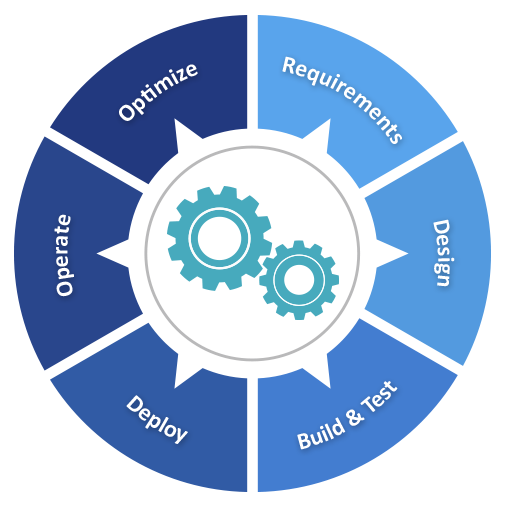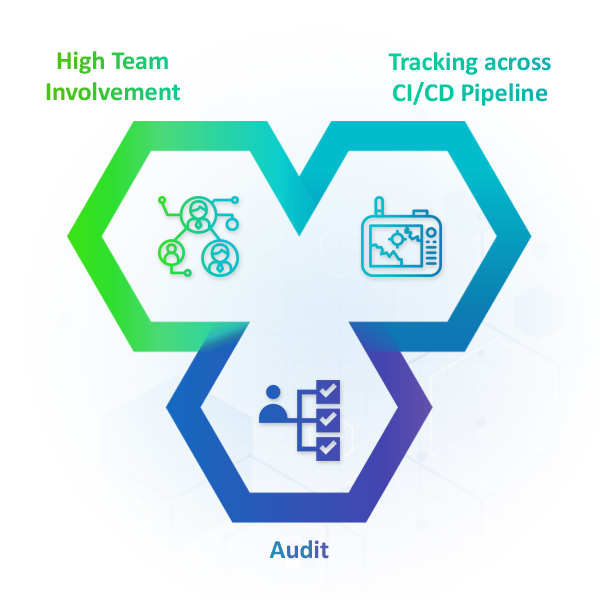DevOps Compliance
Balance Speed and Security, DevOps Compliance SimplifiedDevOps Regulatory Compliance
Win Regulatory With Veritis DevOps Automation
The world has evolved from being limited to traditional processes, leaving only a tiny room for innovation. Today, we have technology solutions that go beyond industry limitations and can even address the ‘regulatory compliance framework,’ which has traditionally been the major hurdle in every change process.
And DevOps stands in first place in this aspect, with ‘rapid change’ as its key defining element. Because of its agility and automation components, DevOps finds it easy to streamline and simplify an organization’s compliance initiatives.
DevOps Vs Compliance
DevOps implementation has shown a new collaborative approach for firms, bringing together different teams onto a single path. However, many firms feel that this option also has some associated concerns.
Because everyone has access to all production systems and data in a DevOps environment, many DevOps organizations fear this would create compliance and regulatory concerns.
DevOps has a good solution for this concern!
DevOps has an efficient way of dealing with systems access. It does so with the help of an orchestration method to ensure compliance is not compromised and only the needed to get direct access to required production systems.
Mature DevOps practitioners avoid giving direct administrative access to systems and manage changes via a central orchestration tool, where abstraction is done to access through a change management automation system.


DevOps Solution to Compliance Concern
Experts opine that DevOps aids compliance more than it affects it. They argue that the real question is ‘not about whether having DevOps or not for compliance’; it’s ‘the way DevOps is being implemented’ that has to be assessed.
According to DevOps practitioners, DevOps tools strive to maintain consistency, reduce complexity, and minimize environmental variability to support compliance. DevOps Automation practices aid test and operations teams by automating test cases, deployments, and configurations, thus ensuring consistency in execution.
Coming to development teams, consistent versions of binaries facilitate compliant components, leaving space for more compliant applications. DevOps tools hold high automation abilities that facilitate consistent and automated execution of compliance requirements.
In DevOps, automated workflows have verification aspects embedded as code, unlike traditional methods involving manual checking. Adopting automation tools also increases the chances of identifying possible risks well in advance, which is reflected in automatic and timely updates of the required out-of-date software.
Implementing DevOps Compliance
While DevOps Automation acts as a solution for compliance challenges in a DevOps environment, implementing DevOps compliance is altogether a strategic approach with:

High Team Involvement
Unlike traditional processes where compliance is a subject for technical teams, DevOps compliance demands engineers know the compliance challenges they must meet. Considering the changing tendency of compliance frameworks, DevOps calls on engineers to be aware of compliance changes within their work environment.Tracking across CI/CD Pipeline
The second step in ensuring DevOps Compliance requires tracking compliance requirements during all stages of the software lifecycle, code development, testing, and deployment. The teams need to ensure compliance is met at all levels, along with a prerequisite for auditing across the software delivery lifecycle.Audit
Pushing aside the misconception that auditing is done during the production stage, DevOps compliance calls for involving audits across all CI/CD pipeline stages with regular monitoring of whether the ongoing work meets compliance goals. This activity helps quickly identify the problem location and meet compliance challenges. Though audit and precise reports might vary, best DevOps practices recommend logging and reporting only compliance-related data.On an EndNote!
Compliance is no longer a separate entity in a software development lifecycle. DevOps bridged the gaps, bringing it closer to the Dev and Ops teams and involving all the teams to check every task performed in line with the organization’s compliance framework.
Meet Veritis Consulting to leverage the DevOps potential!